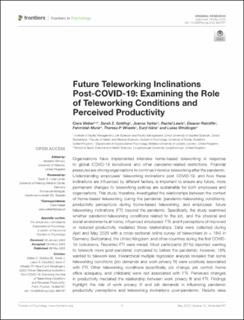Please use this identifier to cite or link to this item:
https://doi.org/10.21256/zhaw-24955Full metadata record
| DC Field | Value | Language |
|---|---|---|
| dc.contributor.author | Weber, Clara | - |
| dc.contributor.author | Golding, Sarah E. | - |
| dc.contributor.author | Yarker, Joanna | - |
| dc.contributor.author | Lewis, Rachel | - |
| dc.contributor.author | Ratcliffe, Eleanor | - |
| dc.contributor.author | Munir, Fehmidah | - |
| dc.contributor.author | Wheele, Theresa P. | - |
| dc.contributor.author | Häne, Eunji | - |
| dc.contributor.author | Windlinger, Lukas | - |
| dc.date.accessioned | 2022-05-12T11:22:37Z | - |
| dc.date.available | 2022-05-12T11:22:37Z | - |
| dc.date.issued | 2022 | - |
| dc.identifier.issn | 1664-1078 | de_CH |
| dc.identifier.uri | https://digitalcollection.zhaw.ch/handle/11475/24955 | - |
| dc.description.abstract | Organisations have implemented intensive home-based teleworking in response to global COVID-19 lockdowns and other pandemic-related restrictions. Financial pressures are driving organisations to continue intensive teleworking after the pandemic. Understanding employees’ teleworking inclinations post COVID-19, and how these inclinations are influenced by different factors, is important to ensure any future, more permanent changes to teleworking policies are sustainable for both employees and organisations. This study, therefore, investigated the relationships between the context of home-based teleworking during the pandemic (pandemic-teleworking conditions), productivity perceptions during home-based teleworking, and employees’ future teleworking inclinations (FTI) beyond the pandemic. Specifically, the study examined whether pandemic-teleworking conditions related to the job, and the physical and social environments at home, influenced employees’ FTI, and if perceptions of improved or reduced productivity mediated these relationships. Data were collected during April and May 2020 with a cross-sectional online survey of teleworkers (n = 184) in Germany, Switzerland, the United Kingdom, and other countries during the first COVID-19 lockdowns. Reported FTI were mixed. Most participants (61%) reported wanting to telework more post-pandemic compared to before the pandemic; however, 18% wanted to telework less. Hierarchical multiple regression analysis revealed that some teleworking conditions (job demands and work privacy fit) were positively associated with FTI. Other teleworking conditions (specifically, job change, job control, home office adequacy, and childcare) were not associated with FTI. Perceived changes in productivity mediated the relationship between work privacy fit and FTI. Findings highlight the role of work privacy fit and job demands in influencing pandemic productivity perceptions and teleworking inclinations post-pandemic. Results raisequestions about the suitability and sustainability of home-based teleworking for all staff. As organisations plan to increase the proportion of teleworking post-pandemic, this study suggests there is a need to support employees who perceived their productivity to be poor while home-working during the pandemic. | de_CH |
| dc.language.iso | en | de_CH |
| dc.publisher | Frontiers Research Foundation | de_CH |
| dc.relation.ispartof | Frontiers in Psychology | de_CH |
| dc.rights | https://creativecommons.org/licenses/by/4.0/ | de_CH |
| dc.subject | COVID-19 | de_CH |
| dc.subject | Remote working | de_CH |
| dc.subject | Home office | de_CH |
| dc.subject | Work privacy | de_CH |
| dc.subject | Productivity | de_CH |
| dc.subject | Teleworking | de_CH |
| dc.subject.ddc | 331: Arbeitsökonomie | de_CH |
| dc.subject.ddc | 658.3: Personalmanagement | de_CH |
| dc.title | Future teleworking inclinations post-COVID-19 : examining the role of teleworking conditions and perceived productivity | de_CH |
| dc.type | Beitrag in wissenschaftlicher Zeitschrift | de_CH |
| dcterms.type | Text | de_CH |
| zhaw.departement | Life Sciences und Facility Management | de_CH |
| zhaw.organisationalunit | Institut für Facility Management (IFM) | de_CH |
| dc.identifier.doi | 10.3389/fpsyg.2022.863197 | de_CH |
| dc.identifier.doi | 10.21256/zhaw-24955 | - |
| zhaw.funding.eu | No | de_CH |
| zhaw.issue | 863197 | de_CH |
| zhaw.originated.zhaw | Yes | de_CH |
| zhaw.publication.status | publishedVersion | de_CH |
| zhaw.volume | 13 | de_CH |
| zhaw.publication.review | Peer review (Publikation) | de_CH |
| zhaw.webfeed | Workplace Management | de_CH |
| zhaw.funding.zhaw | Homeworking during COVID-19 lockdown: Relationships between physical and social environments at home, work fatigue, musculoskeletal pain, and future teleworking inclinations | de_CH |
| zhaw.author.additional | No | de_CH |
| zhaw.display.portrait | Yes | de_CH |
| zhaw.monitoring.costperiod | 2022 | de_CH |
| Appears in collections: | Publikationen Life Sciences und Facility Management | |
Files in This Item:
| File | Description | Size | Format | |
|---|---|---|---|---|
| 2022_Weber-etal_Future-teleworking-post-COVID19.pdf | 1.32 MB | Adobe PDF |  View/Open |
Show simple item record
Weber, C., Golding, S. E., Yarker, J., Lewis, R., Ratcliffe, E., Munir, F., Wheele, T. P., Häne, E., & Windlinger, L. (2022). Future teleworking inclinations post-COVID-19 : examining the role of teleworking conditions and perceived productivity. Frontiers in Psychology, 13(863197). https://doi.org/10.3389/fpsyg.2022.863197
Weber, C. et al. (2022) ‘Future teleworking inclinations post-COVID-19 : examining the role of teleworking conditions and perceived productivity’, Frontiers in Psychology, 13(863197). Available at: https://doi.org/10.3389/fpsyg.2022.863197.
C. Weber et al., “Future teleworking inclinations post-COVID-19 : examining the role of teleworking conditions and perceived productivity,” Frontiers in Psychology, vol. 13, no. 863197, 2022, doi: 10.3389/fpsyg.2022.863197.
WEBER, Clara, Sarah E. GOLDING, Joanna YARKER, Rachel LEWIS, Eleanor RATCLIFFE, Fehmidah MUNIR, Theresa P. WHEELE, Eunji HÄNE und Lukas WINDLINGER, 2022. Future teleworking inclinations post-COVID-19 : examining the role of teleworking conditions and perceived productivity. Frontiers in Psychology. 2022. Bd. 13, Nr. 863197. DOI 10.3389/fpsyg.2022.863197
Weber, Clara, Sarah E. Golding, Joanna Yarker, Rachel Lewis, Eleanor Ratcliffe, Fehmidah Munir, Theresa P. Wheele, Eunji Häne, and Lukas Windlinger. 2022. “Future Teleworking Inclinations Post-COVID-19 : Examining the Role of Teleworking Conditions and Perceived Productivity.” Frontiers in Psychology 13 (863197). https://doi.org/10.3389/fpsyg.2022.863197.
Weber, Clara, et al. “Future Teleworking Inclinations Post-COVID-19 : Examining the Role of Teleworking Conditions and Perceived Productivity.” Frontiers in Psychology, vol. 13, no. 863197, 2022, https://doi.org/10.3389/fpsyg.2022.863197.
Items in DSpace are protected by copyright, with all rights reserved, unless otherwise indicated.